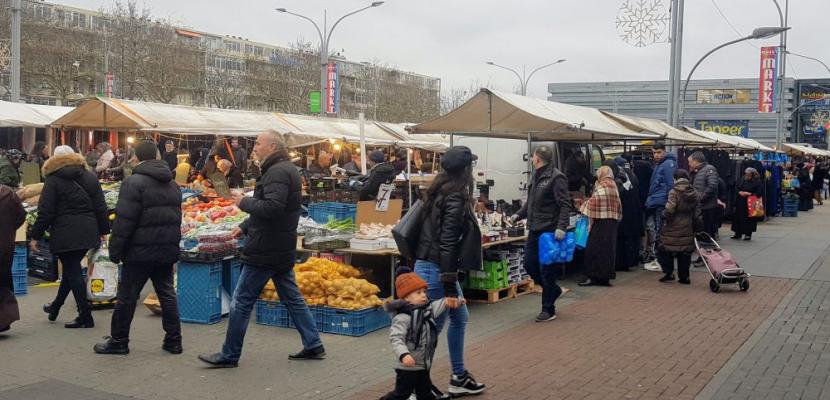Image

Zero Waste Lab Plein 40-45
Published on 28 May 2020

Netherlands
Noord-Holland
This is the good practice's implementation level. It can be national, regional or local.
About this good practice
One of the ambitions of the collective is to organise an alternative waste processing system. As mentioned, litter and waste are two major problems on the market. The use of plastic bags and packaging is exorbitant. While the municipality appointed the quality of the square and the waste problem as a priority, also a group of entrepreneurs have stepped up to take responsibility and try to address this issue through organising a collective approach. Their plain and simple ideas were that a cleaner square would contribute to the appeal of the market, and recycling their waste could be profitable (or to break even at least) instead of the costs they make for waste disposal at present. In the enthusiasm of the primary pioneering period these ideas quickly transposed to ambitions such as being the first plastic free market in the Netherlands, being the cleanest square of Amsterdam, branding and promoting the market with nation wide appeal and the alike. The core building brick of everything would be a stronger sense of community amongst the entrepreneurs so they could take up these challenges themselves, instead of relying and being dependent on the government.Although the belief in self-responsibility and the power of DIY solutions was strong, there was also a realisation that they couldn’t do everything themselves. Ideas changed into the conviction that collaborating with the municipality and other organisations would be more successful.
Expert opinion
The initiators of the Zero Waste Lab Plein 40-45 have well understood that, beyond the obvious environmental aspects, there is also an economic potential to turning a market into a zero-waste place. By doing this, the vendors would contribute to significantly improve the attractiveness of the market and its brand and gain consumers looking for a more sustainable consumption. The zero-waste label would constitute a competitive advantage.
The practice also demonstrates that such initiatives might collide with existing waste collection practices and regulations, thus requiring an open and innovation-oriented mindset also from the relevant public authorities. Getting such processes ging requires first a moderation and balancing of the expectations of the different stakeholders so that a win-win situation can be achieved.
The practice also demonstrates that such initiatives might collide with existing waste collection practices and regulations, thus requiring an open and innovation-oriented mindset also from the relevant public authorities. Getting such processes ging requires first a moderation and balancing of the expectations of the different stakeholders so that a win-win situation can be achieved.
Works at
Interreg Europe Policy Learning Platform
Resources needed
On Plein ’40-’45 the Market Bureau is the most dominant party to play this role. When collaboration is the goal, it is necessary to understand the background and inns and outs of this position, as collaboration is impossible without key stakeholders such as the Market Bureau.
Evidence of success
Driven by the trend to make space for forms of participative democracy, Investigations to start an experiment with co-creation between community initiatives, social entrepreneurs, SME’s, civil society and third sector organisations, and the local government (borough and municipality) have been underway for a few years already. The project Zero Waste Lab 4045 was started to work towards collaborative solutions with different actors among which action researchers from AUAS.
Potential for learning or transfer
In practice there often is a tension between self-organisations and civil servants who tend to support this development on the one hand, and civil servants or departments that adhere to a more centralistic and bureaucratic logic. Not seldom this tension is conflictuous and in such situations it is very hard to differentiate the fundamental principles from ad-hoc or even misused arguments. What is needed then is a third party, more or less independent, who is able to facilitate the process in which positions and ideas are discussed. Depending the situation this facilitation can take different shapes, from a very light version in which it is simply about chairing meetings and helping the actors to understand each other, to an intensive role such a mediating in conflicts or hosting co-design sessions.
Further information
Website
Good practice owner
You can contact the good practice owner below for more detailed information.
Organisation
Zero Waste Lab Plein 40-45

Netherlands
Noord-Holland
